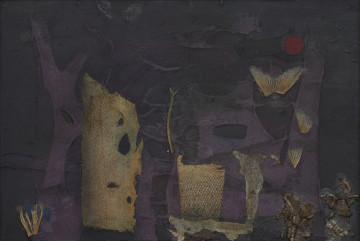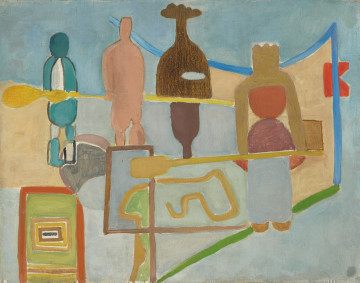
Cannibal Ship
1972
National Museum in Szczecin
Part of the collection: European classics of modernity
Kazimierz Podsadecki graduated from the Faculty of Decorative Arts at the Industrial School in Kraków in 1923. Already during his studies, he cooperated as a graphic artist and typographer with the magazine Zwrotnica, edited by Tadeusz Peiper and co-created by members of the avant-garde movement. His acquaintance with writers resulted not only in commissions for illustrations but also for stage design. Between 1924 and 1926, Podsadecki designed the visual setting for two dramas by Jalu Kurek, Pan z Elektrowni [Mr from the Power Plant] and Gołębie Winicji Claudel [Pigeons of Winicia Claudel], applying the principles of Enric Prampolini's sceno-dynamics. Podsadecki's abstract easel paintings, operating with an incredible palette of blues, violets and greys, organic shapes and textural experiments, definitely stood out from the then production of Polish constructivists. That was made evident by the Praesens group's first exhibition at the Zachęta National Gallery of Art in Warsaw (1926), where Podsadecki presented eight guest paintings. At this time, he became interested in the technique of photo collage. After the collapse of Zwrotnica, he started to cooperate with the Ilustrowany Kurier Codzienny concern and its titles Na Szerokim Świecie and Światowid. After the second photomontage artist, Janusz Maria Brzeski joined the editorial team; both artists promoted international creators of mechanical-optical images. In 1931, they organised the First Exhibition of Modernist Photography at Kraków's Industrial Museum, where works were presented by, among others, Lászlo Moholy-Nagy, Man Ray and Hans Richter. A year later, they established there the Studio of the Polish Avant-garde Film (SPAF). At the same time, Podsadecki participated (alongside Kurt Schwitters and Jan Tschichold, among others) in an international exhibition of typography entitled Drukarstwo nowoczesne [Modern Printing], organised by Władysław Strzemiński and the a.r. group at the Institute of Art Propaganda in Łódź. In 1933, an experimental short film Beton [Concrete] was made by Podsadecki and Brzeski. The former also created his last completely abstract paintings of the period, such as the organic Kompozycja bezprzedmiotowa [The Non-Objective Composition] from the Szczecin collection.
Szymon Piotr Kubiak
Author / creator
Dimensions
cały obiekt: height: 40 cm, width: 30 cm
Object type
painting
Creation time / dating
Creation / finding place
Identification number
Location / status

1972
National Museum in Szczecin

1966
National Museum in Szczecin

1949
National Museum in Szczecin
DISCOVER this TOPIC
National Museum in Szczecin
DISCOVER this PATH
Educational path